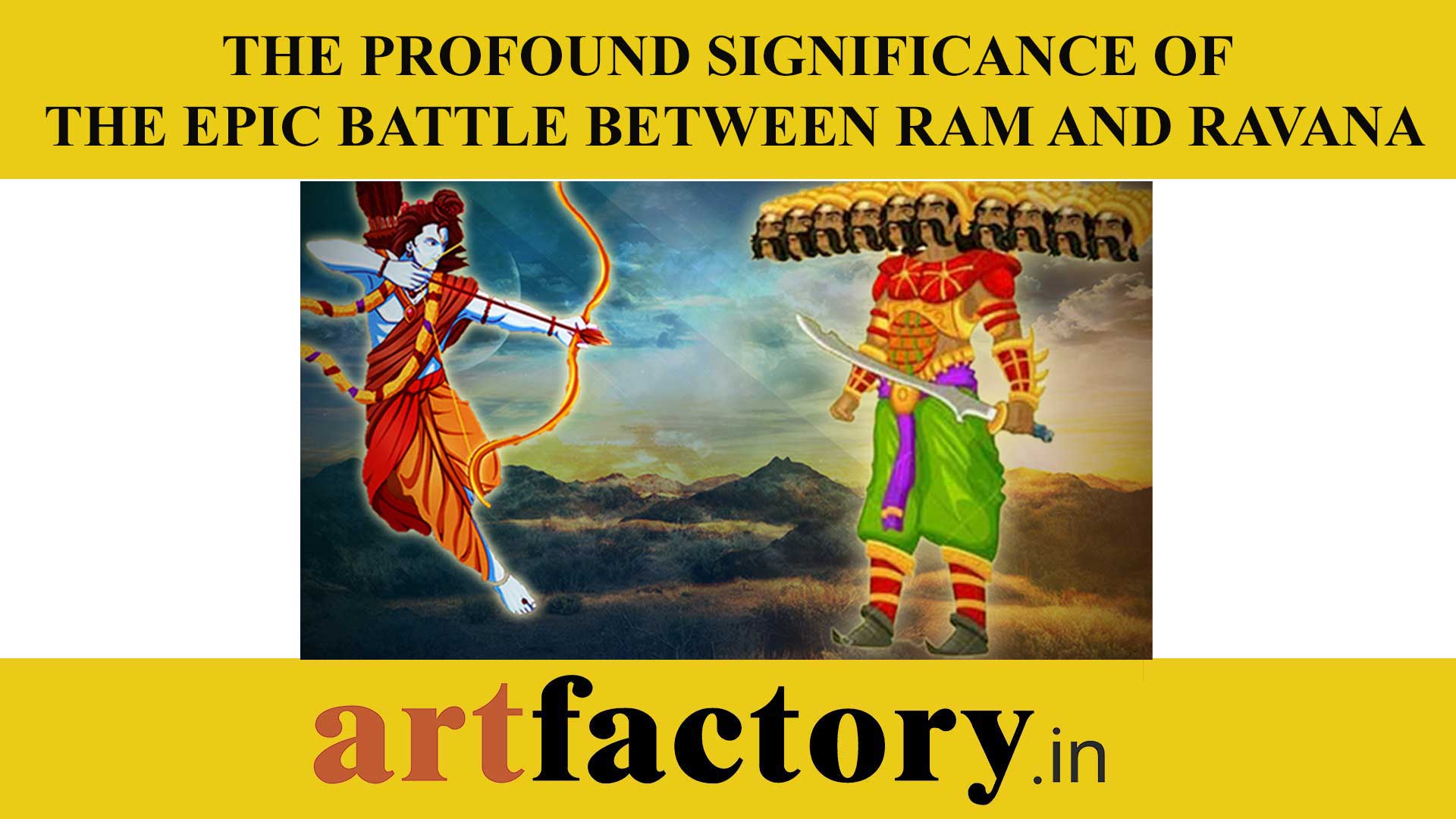
The Profound Significance of the Epic Battle Between Ram and Ravana
The Ramayana, one of the ancient Indian epics, narrates the timeless tale of good versus evil, virtue against vice. At the heart of this epic is the monumental battle between Lord Rama, the seventh incarnation of Lord Vishnu, and Ravana, the formidable demon king of Lanka. The significance of this epic clash extends beyond the realm of mythology, offering profound lessons that resonate with humanity even today.
Symbolism of Virtue and Vice: The battle between Ram and Ravana symbolizes the eternal struggle between righteousness (dharma) and unrighteousness (adharma). Lord Rama, the epitome of virtue, righteousness, and moral integrity, represents the forces of good. In contrast, Ravana, with his ten heads and immense power, symbolizes the embodiment of evil and arrogance.
Victory of Dharma: The Ram-Ravana battle serves as a metaphor for the triumph of dharma over adharma. Lord Rama adheres strictly to the principles of righteousness, duty, and devotion, while Ravana succumbs to his unchecked desires and ego. The eventual victory of Lord Rama signifies that, despite facing immense challenges, staying true to dharma ultimately leads to success and prosperity.
Lesson of Sacrifice and Loyalty: The Ramayana is replete with instances of sacrifice and loyalty. Sita's unwavering devotion to Rama during her captivity, Lakshmana's selfless service to his elder brother, and Hanuman's undying loyalty all exemplify the importance of sacrifice and loyalty in the face of adversity. These values remain relevant in contemporary times, underscoring the significance of selfless devotion and commitment.
The Power of Unity: Rama's success in the battle is not a solo accomplishment; it is a result of collaboration and unity. His alliance with Hanuman, Sugriva, Lakshmana, and the Vanara army highlights the significance of teamwork. In our own lives, fostering collaboration and working together towards common goals can lead to greater achievements.
Consequences of Arrogance and egoism: Ravana's downfall is attributed to his unchecked arrogance and egoism. His refusal to acknowledge the supremacy of divine principles and his disregard for the consequences of his actions lead to his ultimate demise. The battle serves as a cautionary tale, warning against the destructive consequences of ego-driven decisions and the importance of humility in the face of divine forces.
Hanuman's Devotion and Self-Realization: Hanuman, the devoted disciple of Lord Rama, plays a pivotal role in the Ramayana. His unwavering devotion, exceptional strength, and selfless service showcase the transformative power of true devotion. Hanuman's leap across the ocean to find Sita exemplifies the boundless potential of selfless love and devotion, inspiring millions to strive for self-realization and spiritual growth.
Balancing Power and Compassion: Rama, despite being a powerful warrior, embodies compassion and empathy. The lesson here is that true strength lies in balancing power with compassion. In our pursuit of success, we must not lose sight of our humanity and the impact of our actions on others.
Conclusion: The battle between Ram and Ravana is not merely a mythological event but a timeless narrative that imparts valuable lessons about the triumph of good over evil, the significance of virtue, sacrifice, loyalty, and the consequences of arrogance. The Ramayana continues to serve as a guiding light, offering profound insights into the human condition and emphasizing the eternal struggle for righteousness. The epic battle stands as a testament to the enduring power of divine principles and the eternal relevance of its teachings in shaping a harmonious and righteous society.
Q&A:
Q: What is the central theme of the battle between Ram and Ravana in the Ramayana?
A: The central theme of the battle is the eternal struggle between righteousness (dharma) and unrighteousness (adharma). It symbolizes the triumph of virtue over vice, with Lord Rama representing the forces of good and Ravana symbolizing evil and arrogance.
Q: How does the Ram-Ravana battle convey the lesson of sacrifice and loyalty?
A: The Ramayana illustrates the importance of sacrifice and loyalty through characters like Sita, Lakshmana, and Hanuman. Sita's unwavering devotion, Lakshmana's selfless service, and Hanuman's undying loyalty exemplify the value of commitment and sacrifice in the face of adversity.
Q: What does Ravana's downfall signify in the context of the epic?
A: Ravana's downfall is attributed to his unchecked arrogance and hubris. His refusal to acknowledge divine principles and disregard for the consequences of his actions serve as a cautionary tale, highlighting the destructive outcomes of ego-driven decisions.
Q: How does the Ramayana emphasize the consequences of arrogance and the importance of humility? A: Ravana's arrogance leads to his ultimate demise, underscoring the importance of humility in the face of divine forces. The narrative warns against the destructive consequences of ego-driven decisions and emphasizes the significance of acknowledging higher principles.
Q: What role does Hanuman play in the Ramayana, and what does his character signify?
A: Hanuman, a devoted disciple of Lord Rama, plays a pivotal role in the Ramayana. His unwavering devotion, exceptional strength, and selfless service showcase the transformative power of true devotion. Hanuman's character signifies the boundless potential of selfless love and devotion, inspiring others to strive for self-realization and spiritual growth.
Q: How does the Ramayana remain relevant in contemporary times?
A: The Ramayana's timeless teachings on righteousness, sacrifice, loyalty, and the consequences of arrogance continue to be relevant in contemporary times. The epic provides valuable insights into the human condition and serves as a guiding light for individuals seeking to lead a harmonious and righteous life.
Q: What is the ultimate message conveyed by the victory of Lord Rama in the Ram-Ravana battle?
A: The victory of Lord Rama signifies that, despite facing immense challenges, staying true to the principles of righteousness (dharma) ultimately leads to success and prosperity. It reinforces the idea that adhering to virtuous values is essential for overcoming adversity and achieving lasting triumph.

Comments : (0)